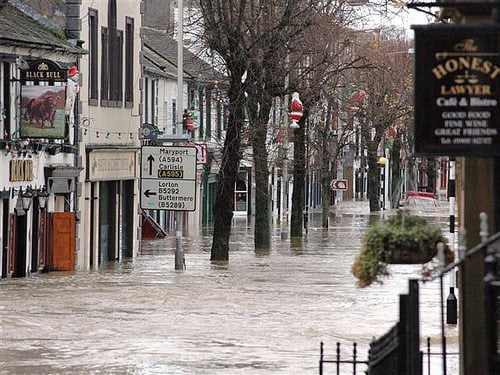

Environment
Investment needed to protect UK infrastructure from climate change risks
The UK’s crucial energy, transport, waste and water infrastructure is at risk from the impacts of climate change because of a lack of investment, a damning new report has warned.
Such neglect is also affecting the UK’s competitiveness and the quality of life of its citizens, the report says, while growing future risks caused by extreme weather look set to exacerbate the problem.
After the wettest British winter since records began, the Institution of Civil Engineers’ (ICE) State of the Nation: Infrastructure 2014 report urges the government to improve the country’s resilience to such threats.
The report grades the UK’s transport, energy, flood, waste and water networks from A to E – with A meaning “fit for the future”, and E being “unfit for purpose”.
The nation’s local transport infrastructure is rated D-minus, flood defences and energy networks C-minus, waste infrastructure C-plus, and water and strategic transport B.
ICE warns that the increasing demand for energy, poor resilience to flooding and neglect of flood defences and local transport represent some of the biggest threats to the UK’s future.
One-third of local roads are said to be in urgent need of attention, while in the next decade, around a fifth of the UK’s energy generating capacity is expected to be retired. As a result, hundreds of billions of pounds in investment is likely to be needed.
“As the 2013/14 winter floods showed, unplanned interruptions in our networks are costly to society and the economy”, said report chair and ICE vice-president Keith Clarke.
“They happen because we are trying to run all services at all times, and are deemed unacceptable as the public expect a certain level of service. The government ultimately bears the risk for the resulting impact.”
While demanding that more to be done, the report also raises the concern that, as the population grows and the impacts of climate change take hold, the failure of some infrastructure may be inevitable.
It even suggests that the public may need to change their expectations, learning to accept that not all public services will be maintained in the future, or that some homes cannot be protected from flooding.
“Clearly there are some difficult decisions ahead regarding just how resilient the UK should be, and also what networks can and should operate 24/7 in what conditions. We can then plan more effectively – avoiding costly unplanned disruptions – and adapt. Management of the public’s expectations on availability during adverse conditions will need to form a key part of this process.
“The onus is on the government to make these choices for public sector infrastructure, and it must also build on its efforts to provide the right regulatory incentives to improve resilience within private sector infrastructure,” Clarke added.
KPMG UK head of infrastructure, building and construction Richard Threlfall told Construction News that the report forces us “to confront reality”.
He added, “Are we a nation that will accept electricity rationing, or regular closure of rail and road networks in the event of flooding?
“It is a challenge to all our political parties either to grasp the nettle now and invest for a 21st century society, or explain to voters why the standard of living we enjoy today may not be as good for our children.”
Further reading:
Government must invest more in flood defences, say MPs
Climate change increasing flood risk in the UK
New report lays down climate change challenge to energy sector
UK weather will ‘change rapidly’ because of climate change, experts say
European flood losses could increase four-fold by 2050


 Environment12 months ago
Environment12 months agoAre Polymer Banknotes: an Eco-Friendly Trend or a Groundswell?

 Features11 months ago
Features11 months agoEco-Friendly Cryptocurrencies: Sustainable Investment Choices

 Features12 months ago
Features12 months agoEco-Friendly Crypto Traders Must Find the Right Exchange

 Energy11 months ago
Energy11 months agoThe Growing Role of Solar Panels in Ireland’s Energy Future






























